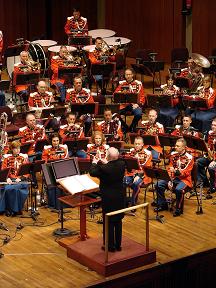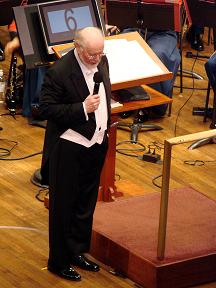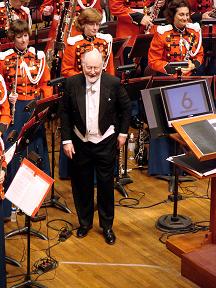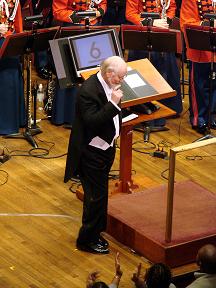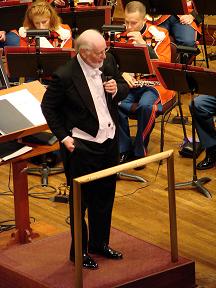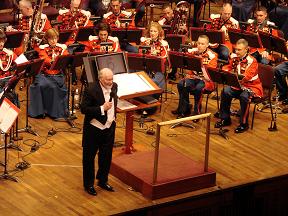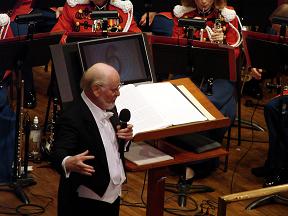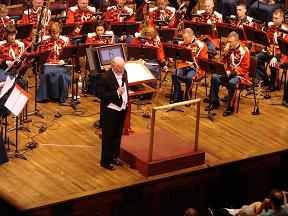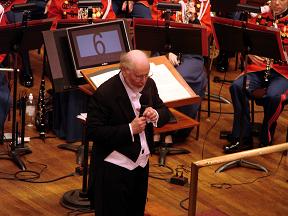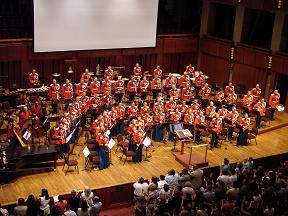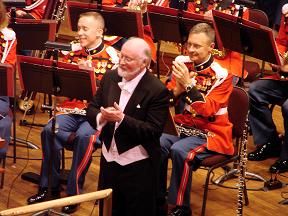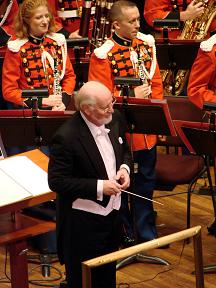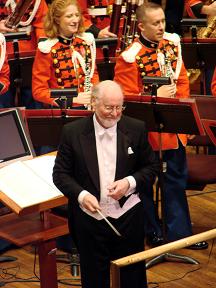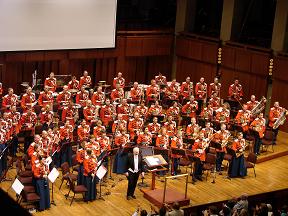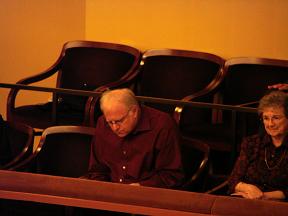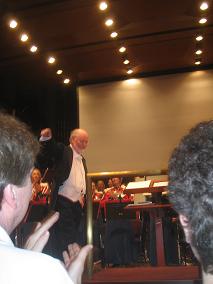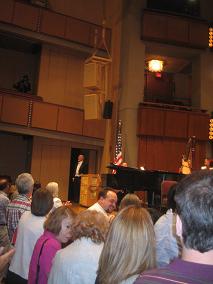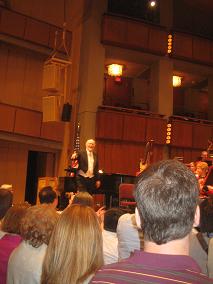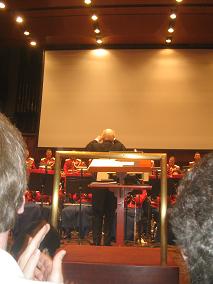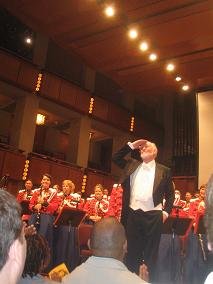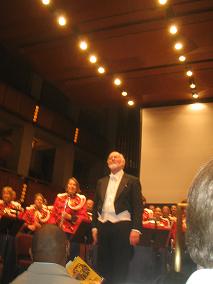Marine Band Concert Hall
John F. Kennedy Center for the Performing Arts, Washington, DC
July 20, 2008
“The President’s Own” United States Marine Band Conducted by JOHN WILLIAMS
CONCERT PROGRAM
- John Stafford Smith/lyrics Key
The National Anthem, “The Star-Spangled Banner” - March from Superman
- Excerpts from Close Encounters of the Third Kind
- Suite from The Reivers, narrated by former Wyoming Senator Alan Simpson
- March from 1941 INTERMISSION
- Liberty Fanfare
- “Out to Sea” and “Shark Cage Fugue” from Jaws
- Techniques of Film Scoring:
Indiana Jones and the Last Crusade - “The Adventures of Mutt” from Indiana Jones and the Kingdom of the Crystal Skull
- “Harry’s Wondrous World” from Harry Potter and the Sorcerer’s Stone
- Theme from The Sugarland Express
- Tribute to George Lucas and Steven Spielberg
Jaws
Star Wars
Raiders of the Lost Ark
E.T. (the Extra-Terrestrial) ENCORE #1 - Clarinet solo from The Terminal
- The Olympic Spirit
ENCORE #2
- “The Imperial March”from The Empire Strikes Back
- Medley of Marine/Air Force/Navy/Army songs
Concert Review by Douglas S. Lacey
We arrived at the Kennedy Center around 6:15 PM, hoping to avoid overloaded parking lots with the Lion King performance starting at 7:30 PM. Fortunately, there was plenty of parking. We plopped down into a nice leather sofa down a hallway between the Opera House (where Lion King was showing) and the Millenium Stage (where at one point I heard an ensemble playing what I believe was Schubert’s Trout Quintet), where we enjoyed a pre-dinner drink. At about 6:45, we headed over toward the Concert Hall where we were greeted with a throng of people waiting for the doors to open. We piled into the mass of humanity and waited it out; thankfully, they took pity on us and opened the floodgates a little early.
Since it was general admission, a free-for-all for seating ensued. Instead of messing with the Orchestra level, we headed up to the 1st Tier (two levels above the Orchestra level). We were hoping to land seats in the Box Tier (one level above the Orchestra level), but that level was reserved for special guests and officers. We decided upon seats in the first row of the 1st Tier, about halfway between the stage and the back of the theater. They weren’t bad seats but a portion of the stage was blocked from view; we could not see the left side of the stage, where piano, drum set, and small string section were, and where Williams entered each time, unless we leaned forward over the railing a bit.
Prior to the start of the concert, there were about a dozen or so musicians on the stage, warming up in street clothes, which was a bit off-putting at first. We fully expected them to be in their usual regalia. After they all left the stage and reappeared for the concert, they were decked out in their full dress.
After an introduction by the Director(?) of the Band, Williams took the stage to rousing applause and set immediately into “The Star-Spangled Banner”. If I’m not mistaken, this was the arrangement he conducted at Fenway Park and not the one that appeared on the recent Naxos CD, but I could be wrong about that. It seemed to start right in whereas the Naxos version has a bit of an extended beginning.
A lively “March” from Superman followed with a somewhat thin “Excerpts from Close Encounters of the Third Kind“. It was competently played by the Band, but without a full string section, I think this piece lacks something.
Williams then hopped on the microphone to introduce his “Suite” from The Reivers and the narrator, former Wyoming Senator Alan Simpson, who Williams said could have given Henry Fonda and Gregory Peck a run for their money had Simpson headed out to Hollywood instead of entering politics. Now, I had very high expectations for this performance, and fully anticipated this to be the highlight of the evening, but overall, I felt that Simpson’s delivery was too flat and just as with Close Encounters, I lamented the loss of a full string section. Simpson did perk up two or three times but to the extent that those moments seemed out of place with the balance of his narration. The car horn effects garnered a laugh from the audience.
Next came what I believe to be the highlight of the evening: “March” from 1941. The Band really nailed this one, probably since it’s more akin to their usual repertoire than the other selections up to this point. It was a fitting end to the first half of the concert, leaving the audience on such a rousing high note.
The second half began with a very well-played “Liberty Fanfare”, though admittedly, it is not one of my favorite concert works by Williams.
Concert staples “Out to Sea” and “Shark Cage Fugue” from Jaws followed, though I suspect most of the audience wouldn’t have known what they were from had it not been listed in the program. In fact, Williams hopped on the microphone again after this performance and made a comment that the previous selections were from Jaws but were obviously not the “duh dum” music everyone was used to. He went on to discuss his relationship with Spielberg and passed along his “this film deserves a better composer” / “yeah, but they’re all dead” story to great laughter from the audience.
Williams then moved and introduced the Techniques of Film Scoring: Indiana Jones and the Last Crusade segment in which he first narrated the projected, sans-music film excerpt and then proceeded to conduct “Indy’s Very First Adventure” to the projected image. This was the first time I had seen this live, though previously I have seen him do something similar to the “Finale” of E.T., and it was quite effective, even if some of the music “hits” were a bit late to the image.
Williams then announced that he was going off-program, with a performance of “The Adventures of Mutt” from Indiana Jones and the Kingdom of the Crystal Skull, which was a nice treat for the audience.
The kids in my section perked up a bit when Williams announced “Harry’s Wondrous World” fromHarry Potter and the Sorcerer’s Stone. Up to this point, the young girl behind me kept asking her father, “What is this from?” Williams joked that the Harry Potter books/franchise was the greatest British export since The Beatles, a joke I’m sure he’s used before. This performance was accompanied by a montage of scenes from the first four Harry Potter films to great effect.
Williams, continuing his talkative mood for the second half of the concert, introduced “Theme” from The Sugarland Express with a story about the 23-year old director who wanted to work with him on the film. The flautist (Gail Gillespie) did a superb job and I was mightily impressed with the performance overall, for a score that hasn’t done much for me in the past.
The hodge-podge Tribute to George Lucas and Steven Spielberg: Jaws, Star Wars, Raiders of the Lost Ark, and E.T. (the Extra-Terrestrial) ended the program proper, again accompanied by images of the respective films/series. I’m not a big fan of this suite but the crowd really ate it up. As with other performances of the main theme from Jaws I’ve seen, the audience laughed out loud as soon as they heard the “duh dum”. ![]()
After whipping the audience up into a frenzy with the last scheduled piece, he toned it down a bit with the first encore, a delightfully-performed “The Tale Of Viktor Navorski” from The Terminal which was another highlight of the concert for me. He then countered with a standard, a tightly-performed“Imperial March” from The Empire Strikes Back which drove the audience to thunderous applause, which fed right into the third encore, “Olympic Spirit” accompanied by slo-mo images of various Olymipc athletes and their accomplishments (no Mary Lou Retton, though).
For his grand finale, catering to the militaristic audience, Williams and the Band finished off with an“Armed Forces Medley”, during which members of the audience stood when their branch’s theme was played. A fitting end to a great concert. As I mentioned above, Williams pulled out his patented “napping child” gesture to indicate that the show had come to an end.
Concert Review by David P. Daniels
This concert was so incredible. I’ve been to two Williams concerts before (the Boston concerts of 2007 and 2008) and so this was my third – and by far the best. Here are my thoughts:
Star Spangled Banner. This was second performance ever (I believe) of the brass-only version that JW used to open the World Series in Boston. As most of you know, it is fairly dissonant at parts, and I’m sure that shocked the crowd (most of whom were over 70, and probably not used to hearing a “weird” version of the star spangled banner ever, let alone in Washington DC.) When the low brass takes over the melody (“And the rockets’ red glare…”) I thought the melody was a little timid, and there were one or two very minor missed notes. The rest of it pretty outstanding. The percussion didn’t overpower the brass as they did at the World Series opener. However, at times (mostly the beginning) the tempo seemed a little uneven with the brass.
Superman. Fantastic. I’ve never heard this played better. With the trombones standing in for the cellos at the love theme, it had more “punch” than the original recording. All the woodwind runs were excellent. But the trumpets were truly outstanding. When I heard the Boston Pops play Superman in 2007, there were a few glaring trumpet errors that really killed it for me (I realize this sounds pretty dramatic) I know the parts are very hard – hell, I play the trumpet – but when I go to a Boston Pops concert andSuperman is the second song (as it was in this performance), it really sucks when the trumpets on the main theme sound like they’ve been playing for 40 hours. (In their defense, the Pops do play the same set of songs every night.) But the Marine band trumpet section (12 people, I think) simply blew them out of the water, sounding heroic and majestic, and with zero note flubbing. It was awesome. John Williams, of course, did the ritard on bar 7 beat 4 that he generally does in his concert Superman performances, which sounds great. The way he conducted was never really time-precise – he mostly pointed at sections for balance reasons – but his conducting WAS very precise for big moments like that ritard.
Excerpts from Close Encounters. Truly unique. The atonal sections at the start sounded incredible with the band, but the latter lyrical sections lacked some of the warmth that comes from a big string section. Still, that was not the band’s fault, and their performance was top-notch.
Suite from The Reivers, narrated by former Wyoming Senator Alan Simpson. This was quite long (over 10 minutes) and I only recognized the main theme from the Reivers, but it was very delightful. The standouts here were the woodwind section, showing a lot of spunk throughout, and the upright bass / “drum set” (created by percussion) who looked like they were having a TON of fun in the more “jazzy” parts of this suite (JW also seemed to enjoy these parts a lot). The narration of this suite by Senator Simpson was quite colorful and really seemed to make the suite a sort of “tone poem.” Some of it was elegiac, but much of it simply sparkled with “old-time” fun.
March from 1941. Very fun, and sounded identical to the recorded version. A big crowd favorite.
Intermission of 15 minutes….
Liberty Fanfare. I’m not the biggest fan of this piece (except the opening flourish) – to me, it’s pretty much a second-string Olympic Theme. From now until the concert’s end, the percussion often made all their booms and crashes very loud. I certainly thought it was cool, but it did briefly overpower the rest of the band and I’m sure it would have irritated a lot of “music critics.”
“Out to Sea” and “Shark Cage Fugue” from Jaws. I swear the audience saw Jaws and 99% of them expected the shark theme. I did not, although (embarassingly) I’m not really familiar with the rest of the Jaws soundtrack. So for my first-ever hearing of these pieces, “Out to Sea” was nice and idyllic, and it kind of reminded me of the opening strains of The Patriot Main Title, but it was far, far overshadowed by Shark Cage Fugue, which is a true masterpiece. The tubas of the Marine band particularly stood out (in a good way) with some really insane sixteenth-note runs that went on for several bars, and some very high-register JW tuba playing. The end of Shark Cage Fugue actually reminded me of Revenge of the Sith, or at least ROTS as it would have been composed if JW had written it in the 70s/80s.
Techniques of Film Scoring: Indiana Jones and the Last Crusade. JW played the opening scene from Last Crusade without music (Cross of Coronado), which actually seemed boring, except he also talked us through it and explained how the music would fit and where it was “needed” – i.e. when young Indy falls on the ground, or falls into snakes (represented by swirling, dissonant clarinets and horns), or acts heroically. Then he played the scene again with the Marine band playing a score transcription. Again, really outstanding. I remember the french horns were really outlandish and just really blasting their heads off (effecting hilarity, since it was a comedic scene). The upper woodwinds had some incredibly challenging string-style runs that they executed flawlessly. JW kept remarking “This is/was really a lot fun!” and seemed to be having a GREAT time with a great band. The audience cheered during the bit of the Raiders March at the very end of the clip, as young Indy escapes.
“The Adventures of Mutt.” NOT on the program, as JW said, a bit surprised and annoyed. This piece was FANTASTIC. It sounds so, so much better than the actual soundtrack version. The fast string scales on the original track sound pretty wimpy, in my opinion. When woodwinds are playing them instead, it sounds intense, energetic, and just overall awesome. I suppose the brass could have been more solid in the imitative bits-of-Raiders-March-section, but this version was still simply better than the soundtrack version.
“Harry’s Wondrous World” from Harry Potter and the Sorcerer’s Stone. This was played in front of a montage of clips from Harry Potter movies 1 through 4, exactly as it had been played at the Boston Pops Film Night 2008 in May. Unfortunately, this was the ONE piece where I felt the lack of string instruments really sapped a lot of the “magic” (sorry) from the song. So much of the main “soaring” theme depends on the sound of violin/viola/cello in multiple octaves (with horns), and it wasn’t really the same with just woodwinds and horns. This is especially awkward when when the flutes have to do their “fluttery” triplets, leaving the clarinets to carry the melody themselves (which is really impossible, and the clarinets were overpowered). In my opinion the middle “wintry” section with the Harry Family theme seemed particularly weird without the lightness of strings (replaced by too-harsh mallets and upper WWs), and JW seemed quite relieved to get to the “Quidditch” part, which is much more suited to brass and woodwinds. The loud ending was excellent (since strings were no longer the forefront of the sound).
Theme from The Sugarland Express. Most of the band left during this part. Featured a flute soloist who was pretty good, although I wouldn’t call this a highlight of the concert, as I found the part itself to be kind of boring. Still, I guess it is important to have a contrast from the huge bombast (which I love, of course) and give the brass players a rest.
Tribute to George Lucas and Steven Spielberg: Jaws / Star Wars / Raiders of the Lost Ark / E.T. (the Extra-Terrestrial). Identical to the Boston Pops film night 2007 performance – a montage of clips from these movies accompanied the main theme from each movie. In general, great. The transition from Jaws to Star Wars (with the ostinato moving right into the first note) was kind of awkward (more so than in the Boston Pops performance). Also one of the trumpet players screwed up a few notes of the Star Wars theme, but I guess you can’t ask for trumpet perfection throughout the ENTIRE concert… Raiders of the Lost Ark was very good, and E.T. was outstanding and a strong closing. Star Wars was met with HUGE applause, and so were Raiders/ET (to a lesser extent).
Huge applause, and a standing ovation leads to….
ENCORE #1
Clarinet solo from The Terminal – this Clarinet solo was fantastic and, IMHO, much better than the flute solo from Sugarland. This clarinet player was really into it (and had memorized his music, whereas the flute player needed a stand for hers), and he really played with energy and emotion. Also of note was the pianist, who switched to accordion – at one point he had some REALLY virtuosic parts (also memorized) that doubled the clarinet solo, and I was very impressed.
The Olympic Spirit – Played against a backdrop of Olympic athletes in action. The Marine band played this well, but having played their exact arrangement before, I can say that it is very tough to play and even harder to make it sound good. The spectacular Marine band only sounded “pretty good” playing it. Still a treat, but I truly wish JW had played Summon the Heroes or the Olympic Fanfare instead…
More applause leads to…
ENCORE #2
“The Imperial March” – An exciting surprise, and a remarkable performance. The ending, again, was particularly great.
Medley of Marine/Air Force/Navy/Army songs – I believe this was a traditional Marine band concert closer. It was pretty cool, as during each “song” people from that part of the military would stand up and be recognized.
CONCLUSION
The good: Superman, Shark Cage Fugue, Indiana Jones and the Last Crusade, Tribute to Spielberg/Lucas, Imperial March, The Adventures of Mutt!
The not-so-good: Sugarland Express, parts of Harry’s Wondrous World
My overall impression: This was the concert of a lifetime. I bet JW almost never conducts a concert band, and this is probably the best concert band in the world (indeed, JW actually claimed it WAS the best at one point). Unlike his concert with them in 2003, he played ALL his own music, and he clearly had a ton of fun the entire time. He was even doing this little dance motion every once in a while on stage. The brass playing was simply spectacular. My comments above are really nit-picky, upon review. This was the best performance I could have possibly expected of (human) musicians playing brass-heavy songs. These trumpets played this better than the Boston Pops trumpets. (Although Boston Pops has ~4 trumpets, and the Marine band has ~12 and could swap them in and out, I’m judging them by the listener’s standpoint, and the Marine Band was simply much better). The tuba section was OUT OF THIS WORLD, especially in the Jaws pieces, and the french horns / trombones / baritones were very solid. The flutes and clarinets were consistently good and had very challenging parts of their own. The percussion was very precise, if a bit overdone at times, but I certainly enjoyed them. I think the clarinet/accordion soloists and the trumpets deserve special praise for a REMARKABLE performance. Along with John Williams himself, of course =)
Get this recording, if and when they make it available. If you’re a hardcore JW fan, you’ll never find a better performance of the Adventures of Mutt.
Pictures courtesy of Douglas S. Lacey
(click to enlarge)
Leonard Slatkin, outgoing conductor of the
National Symphony Orchestra
Pictures courtesy of Jack H. Lee
(click to enlarge)

